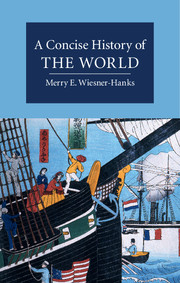‘Few authors have the courage to write a short history of the long human career, and fewer still have the skill to pull it off. Merry Wiesner-Hanks succeeds admirably in fashioning an intelligible story out of the seeming chaos of history. Her book is unique among world histories in the extent of its attention to gender, marriage, family, inequality and other social themes.’
John McNeill - author of The Human Web: A Bird’s-Eye View of World History
‘Merry Wiesner-Hanks’ world history breaks new ground. Informed by her own rich scholarship in gender history and European history, it also distils the immense scholarship of the Cambridge World History, of which she was General Editor. Result? An engaging and up-to-date history of humanity full of historiographical insight and the first world history focusing mainly on human communities, on society and culture.’
David Christian - author of Maps of Time: An Introduction to Big History
‘This is a clear and compelling presentation, with a focus derived from basic aspects of human life; it is consistently well-informed, and boasts an imaginative and defendable chronology particularly for the modern period.’
Peter Stearns - author of World History: The Basics
‘Merry Wiesner-Hanks’ A Concise History of the World is a unique and fascinating exploration of the world from early human history to the present. Unlike other texts that tend to be dominated by political and economic narratives, [this book] takes social and cultural issues - particularly those focused on gender, the family, sexuality, and material culture - as its primary focus. It is also distinctive in that its five chapters take a chronological and topical rather than a regional approach to the world, allowing Wiesner-Hanks to select examples from multiple societies in each chapter to illustrate her themes. A Concise History of the World is a truly refreshing approach to global human history, written by a master in the field.’
Heather Streets-Salter - author of Modern Imperialism and Colonialism: A Global Perspective
‘The distinguished world historian Merry Wiesner-Hanks has produced an exceptionally helpful introduction to the language and current preoccupations of the world history field. A Concise History of the World offers a clear chronological structure with thematic emphases on cultural and social history, and on production and reproduction, that are very much to be welcomed.’
R. I. Moore - author of The War on Heresy
'One planet, [405] jam-packed pages: autodidacts in a hurry are urged to absorb, but first admire, this feat. The author, a former general editor of the Cambridge World History, accomplishes it without once writing 'moving swiftly on', and with a welcome alertness to social and cultural issues, sexuality, gender, material culture, ethnicity, slavery and wealth distribution. The remit could not be more vast, but the authorial eye on everything from the Venus of Brassempouy to a note pinned to a foundling in eighteenth-century London is keen and laser-sharp.'
Source: Times Higher Education
'This affordable, commonsense look at all human history is divided into five chapters, each covering a shorter period of time than the previous one … With this sense of scale, the focus is naturally global and not Eurocentric … Wiesner-Hanks's balance between macro and micro history gives readers a sense of the big picture while explaining how it functions in key locations. The author is able to take complex information, e.g., theories about early man, and make them easy to understand, using humor at times. Themes that run throughout the book are histories of families, women, children, and sexuality. Whether discussing roles in foraging lifeways or the gender gap between different keyboard jobs, this analysis remains consistent … Summing up: highly recommended. All levels/libraries.'
M. L. Russell
Source: Choice





